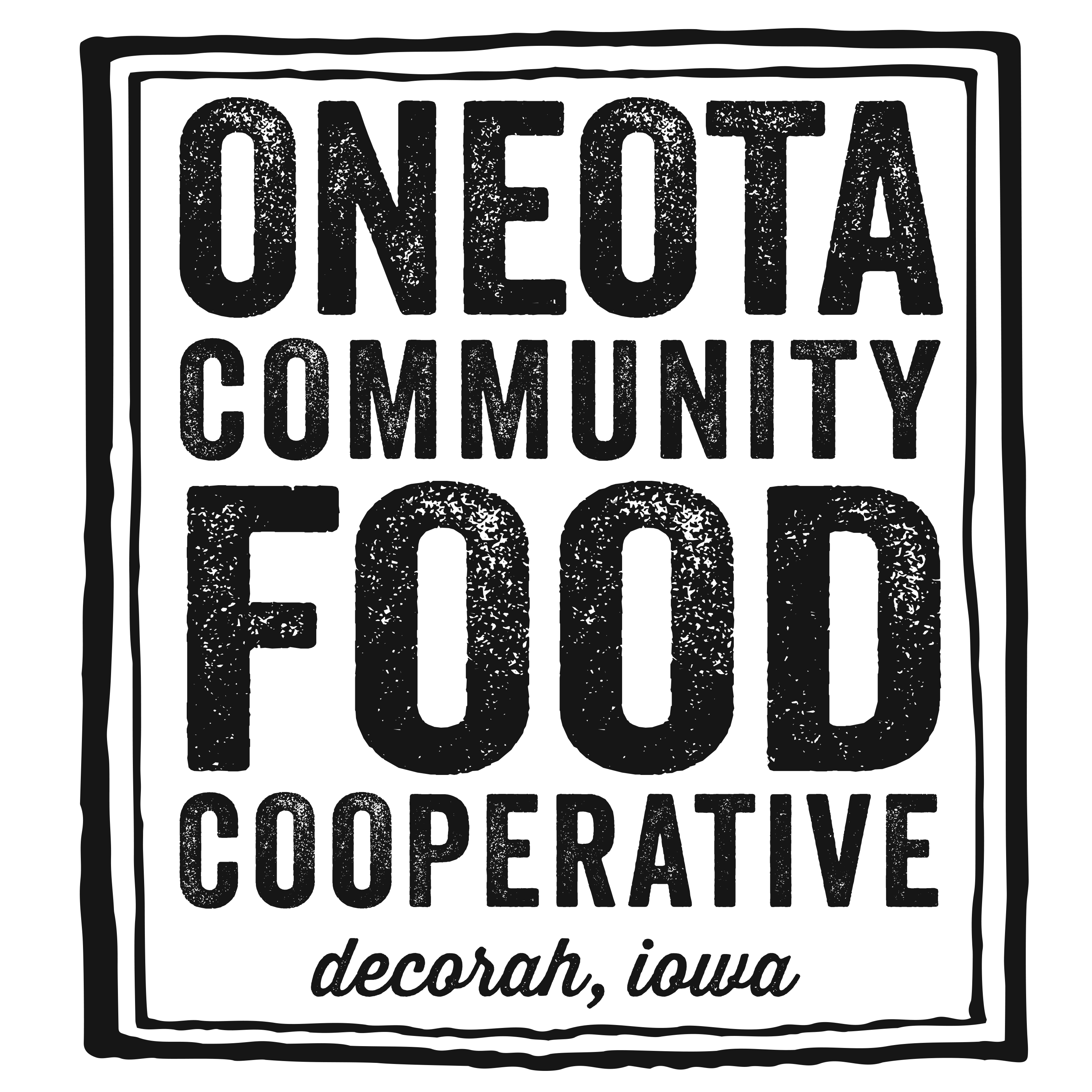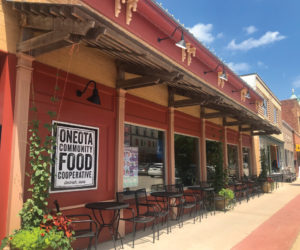Sustainable Pursuits: The McCargar-Sweats
By: Cerrisa Snethen, Co-op Member/Owner
Standing out front isn’t always easy. Former staff member and current Co-op Board Member, Steve McCargar, reflects on where his passion began and where the path of the McCargar- Swets family crossed that of the Co-op in the early years. This family’s dedication to the Co-op and the wider regional community continues to flourish after more than three decades.
Having come to Decorah in the eighties, Heidi and Steve were specifically looking for a peaceful river valley with a food co-op to raise a family and build a life honoring the back-to-the-land movement described in the classic “Living the Good Life” by Helen and Scott Nearing. The McCargar-Swets never seem to take a day off from their work of trying to create a more sustainable community. I wondered how all of this started – a family with this kind of commitment and such a wellspring of hard work and intention to a grassroots mission. Asking Steve what fueled his own passion for healthy and organic food systems to begin with, I was fully unprepared for his answer.
“I saw two rivers burn in my life,” he said, “beginning with the Cuyahoga River in 1965.”
Living in Cleveland at the time, the experience more than proved to be a formative one. The fires were a direct result of the corporate externalization of cost by big businesses, who used air and waterways like the Cuyahoga and Rouge Rivers to dispose of industrial byproducts. Steve described the unimaginable sight of the fires vividly. As he spoke about water burning, it became clear why part of his life’s mission came to include a tireless drive to remove poisons from our ambient environment. Once a director of The Ecology Center of Ann Arbor in Michigan, Steve understands the science behind toxins in our environment and maintains an active opposition to the poisons unleashed on pregnant women and children in particular. He’s been speaking out since 1965 against industrial pesticides, food irradiation, GMO’s, and other assaults on the nation’s food supply. Wife Heidi’s diagnosis of breast cancer at age 35 further helped to put environmental causes of illness in Steve’s uber focused field of vision.
In conjunction with friends Alan and Ellen Macdonald, Heidi and Steve’s quest for the perfect place to live their intentions brought them here. When Steve and Heidi finally made the move to Decorah, they didn’t have work here. But their commitment to the area was enough. Shortly, thereafter, Steve became the first man on the Co-op Central Collective, then made up of seven hard-working women. As part of the management team, they made $1 an hour in 1982, in the Co-op’s second story location in the Old Armory Building. Here, they sold modest amounts of foodstuff – grains stored in large trash cans, quirky jars of spices, and a cooler filled with dairy and some fruit. He remembers it being rare and celebratory if the Co-op’s daily sales hit $100 in those days, and calling members to announce the day they first broke $200.
Back then, McCargar remembers how his strong desire to see the Co-op succeed led him to take interesting and sometimes unorthodox measures – letting little go to waste. “I used to joke that every ecosystem needs a bottom feeder. I was that bottom feeder. I would stock up on expired dairy products like yogurt and warehouse them, sometimes paying full price so we wouldn’t lose the margins.”
Steve reflects fondly on the hours his daughters spent playing in overstock bulk bins, and the tight knit group of children growing up in and around the Co-op, something he sees resurfacing now with a new generation of kids. Daughter Elsa sums up her deeply ingrained experience of growing up in the Co-op culture. “It was great to be a Co-op kid. I mean, as long as there was a seat in the deli and a Waving Grains cookie left in the case, somehow I knew I had a place – that all was right with the world. It was more than just the grocery store where our family shopped for food. It was my whole community. I could walk in those doors any day, and I knew I’d be taken care of – whether I was looking for a snack, a friend, or a ride to four-mile corner. I must have spent a quarter of my waking childhood at the Co-op, playing, studying, eating…watching the world go by.”
Yes, the Co-op wasabout family. But there was a whole lot more to consider if the store was going to stick around. It was Steve’s commitment to the Co-op’s financial situation, his self-described tendency to be a “numbers fanatic” that certainly helped the Co-op maintain a cash situation that would enable the organization to expand in size and scale. In the early days, the Co-op’s membership was an eclectic mash-up of individuals dedicated to a different way of doing business – counter culture types (at the time) like vegetarians, advocates of organic farming and alternative economic systems. It was largely a province of left wing ideologues. A crucial idea Steve shared with many others was the notion that if the Co-op was profitable, that profit should go back into the business itself.
The quest to ensure that the Co-op was profitable, in addition to it being a bastion of philanthropy and the collective good would literally help lay the foundation for future Co-op stores. When Oneota moved from its second story locale to what is now Cedar Dreams Inn on Water Street 1984, the tiny storefront gave the Co-op a brand new visibility and credibility. This is also when the organization decided to move from having a membership fee, to the Co-op’s current model of selling and maintaining membership shares. This cash helped leverage local bank andmembership loans, which is how the Co-op came to own its own buildings, including the one it occupies today. This system made possible slow but steady growth. In 1994 the Co-op was able to borrow $100,000 from its own membership to aid in the move to its previous location, loans it paid off early. This kind of dedication to fiscal responsibility and rapid loan repayment ensured trust within the community.
While the Co-op’s creed was always indicative of putting people over profit, Steve also helped to urge that the store must be profitable in order to be sustained. The idea was that the Co-op’s goals should certainly maintain a sense of altruism but they also had to be anchored in a sound financial position. The store’s current location at 312 West Water was coveted by early Co-op management long before it even became available. “We knew we wanted it. And we were ready for it,” Steve said, describing how the planners conducted a market study on the current space two years before it was even for sale. “We put ourselves in a position,” he said. In 2006, when the previous owner of the building was ready to sell, he knew just who to call. That’s when Co-op leaders began the 1.7 million dollar expansion project. All of this forethought and planning, this dedication to numbers and profitability, in conjunction with a commitment to cooperative principles, has put the organization in the solid financial foothold it maintains today. The store is slated to pay off $200,000 in loans this year alone. The Co-op will shed nearly a quarter million dollars of debt in 2014, proving that alternative economic systems can absolutely work.
Steve’s proud of where the organization sits today. He’s proud of the photovoltaics occupying the roof generating 5-6% of the store’s energy, the Co-op’s ability to control much of its own future, and ultimately beams with pride when he walks in the door and sees daughter Hannah working across practically every department. “When I see Hannah working at the Co-op, I am very happy – extremely proud. I know what an asset she is to the Co-op. I feel the pride of a parent.” He’s proud of the store’s Bulk department, one that he thinks is among the best in the country. I asked him about his hopes for the store’s future. “I want the Co-op to continue to live up to the meaning of its creed, like Martin Luther King Jr. said. It’s commitment to local, organic, bulk food, to return to its membership. The Co-op is so much more than just a grocery store. It’s a focal point for community and planetary healing, a place where people can put into action their values.”
Steve admits that there’s no journey in life without pain, that missions likethat of the Co-op, which seek to grow the greater good, are not without struggle and sacrifice, disagreements and sometimes even division. But he reflects on entire nations, religions, and regions trying to work through conflict and build better futures, and in that big picture view, he adds in a way that is hopeful, that he thinks we can (and do) make beautiful ideas work here. “We have an obligation to make it work here,” he says “sharing all of these things in common.”
On a good day, you might catch McCargar roaming the aisles contagiously singing Motown, signature Waving Grains cookie in hand. When he’s not working on the Co-op board, he’s helping to run Decorah’s dynamic and thriving farmer’s market, advocating for causes he believes in, homesteading,and working with children at local Waldorf-inspired preschool, Kinderhaus. A commitment to kids has always been a part of his life in Northeast Iowa. His love of children and the hope they represent, is palpable. “I want them to live in a community we feel good about. I’m happy I get to feed them organic food…take them to the river…hand them wooden toys, and teach them to use gentle, gentle hands.”
As a man who admits to being “rich in daughters and rich in spouse,” Steve would be content to let Elsa have the last word: “…The Co-op community still has a strong heartbeat, and I am so grateful for its vibrant presence in Decorah. Not just for the good food or the alternative business model, but for a place like that, where we all gather and come in from the cold…connect for a moment across the bulk bins and our shopping lists. I still feel that feeling in my chest, walking back through the Co-op doors after long months away. I see Betsy in the Produce aisle, you know, laughing her big laugh. Charlie waltzing in with his water jugs. The timbre of those familiar voices, the smells, the tiles on the floor. And I’m like, yeah, I’m Home.”



